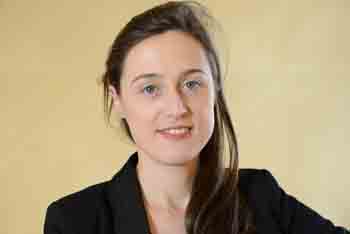
Zofia Mioduszewska
At the brand-new POLIN Museum of the History of Polish Jews, Zofia Mioduszewska has perhaps one of the most rewarding jobs: helping to educate the museum’s youngest visitors about the Holocaust and Jewish life in Poland.
Currently a PhD candidate at the Institute of Polish Culture at the University of Warsaw, Mioduszewska is senior specialist in the youth section of the education department at POLIN. There, she plans educational activities for young students, designs lesson plans, and runs workshops and educational walks around Warsaw. Most of POLIN’s educational offerings utilize testimony from the Visual History Archive.
She is also manager of a project at the museum to give young people the chance to meet Holocaust survivors. Working with the Association of Children of the Holocaust in Poland, once a month a group of about 100 students comes to POLIN to meet child survivors of the Holocaust, hear their stories, and ask questions.
Mioduszewska said this is the last generation of Polish children that will be able to interact with Holocaust survivors in person, so it is especially important to give the students a chance to ask questions as well as allow the survivors to tell their stories. She said young students really like this type of dialogue, and even though their questions tend to be simple, the conversation is less predictable than textbooks or traditional lessons.
“In terms of education and building social, cultural sensibility, firsthand survivor perspective seems to be the most valuable thing we ever get,” Mioduszewska said. “It is so much easier to get to know, remember and understand, when one can get perspective of a real person that did actually live through this history.”
After the program, students often linger to ask more questions and take pictures, and Mioduszewska said she hears from many schools and teachers who want to bring their classes. The survivors, too, are pleased to share their stories with students and feel that doing so commemorates the loved ones they lost.
Ever since a “renewal of Jewish culture” in Poland in the 1990s, Mioduszewska said there continues to be interest in sharing and understanding Polish Jewish culture of the past and present. The new POLIN museum has an opportunity and a duty to fight stereotypes and encourage tolerance in the next generation. The museum provides a place to do just that.
“We must remember about those who lived here in the past, but we also need to notice that a small, but important, community still lives here,” Mioduszewska said. “Poland would be a different country without Poles’ and Jews’ coexistence of many centuries, and the story of this land is complete only when it does include the history of the Jews.”